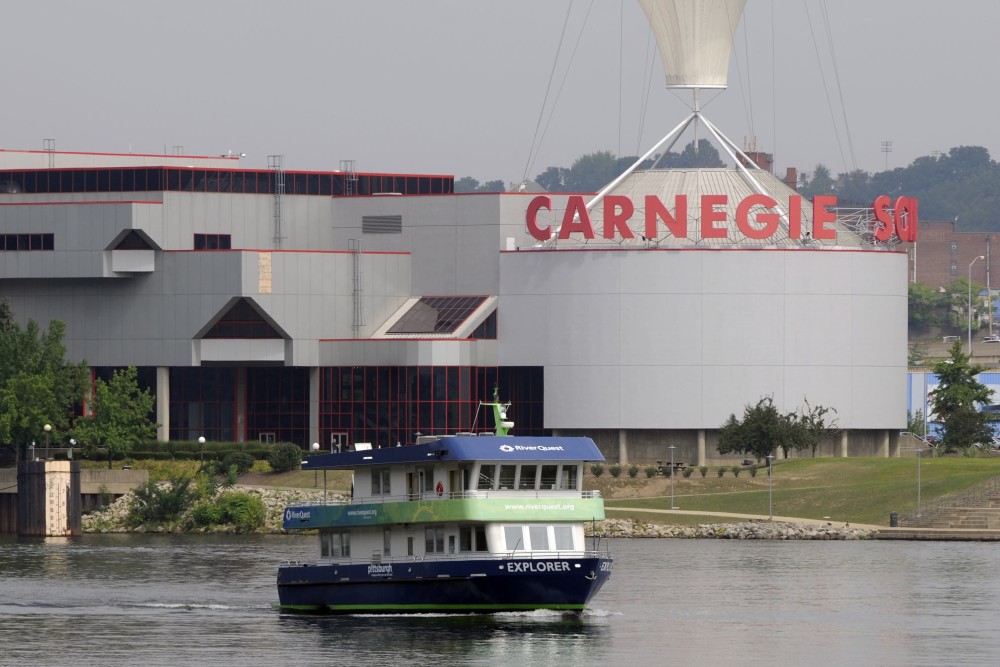By Anya Sostek
Pittsburgh Post-Gazette.
Over the past decade, the Carnegie Science Center has considered itself a leader in the area of science education for girls, creating programs such as science sleepovers, implementing school tours of workplaces of successful scientists and creating a website, CanTEEN, aimed at tween and teenage girls.
So imagine CSC’s surprise to find itself called “disgusting” and “a disgrace” because its sole offering for the Girl Scouts is a program called “Science With a Sparkle” — teaching how to become a “cosmetic chemist.”
The CSC started to notice postings on its Facebook page a week ago — responses to a cropped photo from the science center’s Explore brochure, contrasting its programs for Boy Scouts, such as Chemistry, Engineering and Astronomy, with the lone Science With a Sparkle offering for Girl Scouts.
The next day, websites and blogs such as Jezebel and Wonkette started to take up the cause. “Marie Curie may very well rise from her grave to gnash her teeth,” wrote Jezebel.
“At a time when one of the biggest topics in science education is how to make science interesting to girls, and careers in Science, Technology, [Engineering], and Math (STEM) more attractive to young women, you’re offering MAKEUP?” wrote Wonkette.
“Look, we won’t even ask you to join the 21st century all at once — but could you at least try to emerge from 1958?”
Scores of comments appeared on the Science Center’s Facebook page as well, calling the CSC “shameful” and “ridiculous,” and spreading across social media.
The Science Center responded both Wednesday and Thursday with long posts explaining the rationale for the program. It had tried other programs to appeal to Girl Scouts in the past, it said, such as engineering, chemistry and robotics, but “struggled when it comes to enrollments” for everything except museum sleepovers and Science With a Sparkle.
The response also noted that “any child — boy or girl, Scout or not — is welcome to join in on those programs.”
The Girl Scouts also responded via social media noting that Science With a Sparkle is not an officially sanctioned Girl Scout program.
The science center markets the program to Girl Scouts, as many other organizations do with their programs, but the Girl Scouts did not create or authorize it.
Girl Scouts of Western Pennsylvania does currently run STEM programs on topics such as “It’s Your Planet — Love It” and “Find the Fire,” and has partnership with local groups such as The Phipps Conservancy, said Melissa Cooper, regional Girl Scouts vice president.
The Girl Scouts and the CSC are now working together to create officially sanctioned programming, she said.
“They’re a fantastic location for us and I’d love to partner with them,” said Ms. Cooper. “A tremendous opportunity exists, and this got a conversation started, to say the least.”
As for Science With a Sparkle, the program has been around for about five years, said Linda Ortenzo, director of STEM programs at the science center.
It was actually named years ago by a research panel that presented a group of girls with a few different options. “They picked that one,” said Ms. Ortenzo.
She defended the program, noting that it teaches real chemistry using cosmetics as an entry point.
“Really, it’s a larger discussion about what we offer for girls, and what we know works,” she said. “With girls, presenting them with real world problems is a natural way to get them interested in STEM.”
Furthermore, she said, Science With a Sparkle was just one program among many.
The bottom of the brochure page that was cropped out online featured the “Tour your Future” program, taking girls to businesses such as Schell Games and Valspar.
Popular science center programs such as camps and after school programs are also open to girls, she said.
“There is not one particular avenue for engaging people in STEM — there are many,” she said. “The most important thing is that girls get the message early that STEM is for them.”
Heather Arnet, CEO of the Women & Girls Foundation of Western Pennsylvania, has worked with the science center for years on issues involving gender equity and programming for girls.
For her, the backlash against the science center was somewhat surprising, given their “long historical commitment to the issue of engaging girls in STEM.”
But in all the negative words directed toward the center, she also saw a silver lining.
“What I think was really great was the parent response all over social media,” she said. “You saw mothers and fathers really engaged in this passionate conversation about the need for girls to have equity in STEM offerings and to be engaged in STEM, and that’s a good thing for everyone.”














































































































































































































































































































































































